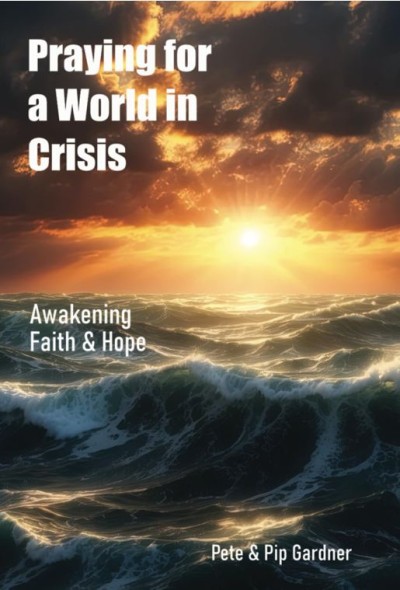As we celebrate Easter this month, we invite you to take a few minutes to watch this video and let your soul be nourished by these words about Jesus and His sacrifice for us.
We are grateful to Solomon, the Vice President of Prayer Ministries and our Pray for Zero leader, for leading us over the next few weeks in reflections to prepare our hearts for Easter.
Stay tuned for more videos, and feel free to share with a friend to bring life-giving encouragement to their day!
Our vision is to see the 110 most unreached cities in the world reached with the Gospel, praying for thousands of Christ-exalting churches to be planted among them!
We believe prayer is key! To this end, we are reaching out in faith to cover this outreach with the powerful prayers of 110 million believers - for breakthrough, praying around the throne, around the clock and around the globe!
 Will you Pray?
Will you Pray?
We would like to invite you to pray for these cities each day for just 10 or 15 minutes!
We are asking God for the establishing of new house churches in these cities. 90% of very unreached peoples live in these 110 cities. Let's pray for the impact of disciple making that will multiply across these peoples and places.
Sign up Here - for your chosen prayer time either personally or with a few others in your organization. When you sign up to pray you will receive a reminder email of your time and also a link to key prayer points for these cities!
Links to all IPC Projects:
https://linktr.ee/ipcprayer
110 Cities Prayer
www.110cities.com | Daily Prayer Fuel Sign Up
Global Family 24-7 Prayer Room
https://www.globalfamily24-7prayer.org/
Prayer Covenant for Children Mobile App
theprayercovenant.org/mobileapp/
Interseed House of Prayer App
https://prod.global.interseed.io/link/groups?id=146
Asia Prayer Summit - 22-24 April 2025, Batam, Indonesia
www.asiaprayersummit.id
United City Harvest Outreach - 23-25 April, Perth
www.soundcitychurch.com.au/united-city-harvest/
Pentecost 25 - Sydney Arise - 17th May
https://events.humanitix.com/pentecost-25-sydney-arise
10 Days to Pentecost: 29 May - 8 June, 2025
www.10days.net
Pentecost 2025 - Global Day of Prayer – Jewish World – 8-9 June
More Info & Guide | Join us Online! (info below)
Zoom ID – 84602907844 Passcode 32223
IGNITE THE FIRE 2025 - Papua, 1-5 July
www.ignitethefire2025.world
We would like to bring to you two resources to encourage you as you pray for people by name…
1. VIDEO: Praying for People by Name – A Powerful New Invitation from Dr. Jason Hubbard
What if the greatest miracles began with the simplest prayer—lifting one name before the throne of God?
In a short but stirring video message, Dr. Jason Hubbard, Director of International Prayer Connect, calls us to a deeply personal and powerful strategy in global intercession: Praying for People by Name.
Rooted in God’s love for every individual and anchored in His desire that none should perish, this video is an invitation to reclaim the intimacy and urgency of intercessory prayer. Dr. Hubbard reminds us that Jesus Himself prays for us by name (Hebrews 7:25), and He calls His Church to join Him in that holy partnership.
This is more than a method - it’s a movement of intentional prayer. Whether you are interceding for a friend, a family member, or an unreached people group, praying by name aligns your heart with God’s heart. It stirs faith, ignites hope, and releases Kingdom breakthrough.
In just a few minutes, you’ll be encouraged to:
- Ask the Holy Spirit to highlight specific names of those He’s calling you to pray for
- Write their names down and begin lifting them before the Lord regularly
- Believe that God is working, even when we don’t yet see the results
We’re seeing a global shift in prayer - away from vague generalities and toward intentional, Spirit-led intercession. Every name matters to Jesus. And when we call on heaven with faith, even one whispered name can echo across eternity.
We invite you to watch the video, share it with your church or small group, and let it inspire a fresh season of prayer.
Together, let’s pray name by name until Jesus receives the reward of His suffering - souls saved, cities changed, nations awakened.
By Name: How to Pray for People and Lead Them to Jesus
Billions of people don’t know Jesus, but God has given you and me the power to change that — and it all starts with prayer.
As you pray for people by name, Jesus gives you His love for them and begins to open their hearts to the Gospel.
In By Name, Brian Alarid will equip and inspire you to pray for people and lead them to Jesus using the five lifestyle habits that Jesus modeled: pray, listen, eat, serve, and share.
This book will help you love people like Jesus and impact your friends, family, neighbors, classmates, and co-workers for eternity.
Brian Alarid is the President and Founder of America Prays and World Prays and the Chairman of Pray For All. He is the author of two books: When People Pray: What Happens When Ordinary People Pray to an Extraordinary God and By Name: How to pray for people and lead them to Jesus.
Brian has a Master’s Degree in Organizational Leadership from Regent University. He has been married to Mercy Alarid for twenty-seven years. They reside in Guatemala City with their three children.
Order ‘By Name’ on Amazon (new from $12.00)
Praying for a World in Crisis: Awakening Faith & Hope
Why is the world in crisis? Do we have a role in ending it? What unseen powers are at work, and does the Bible have anything to say about this? Is there hope? What is the ‘day of the Lord’, and why does it matter? These are some of the questions addressed for engaging in international prayer for a world in crisis.
This book is a wake-up call for the times we are living in. We examine the inter-relationship between geopolitics, cosmic powers and the Great Commission with regard to why the world is in crisis and on the verge of a possible third world war, and how we as believers and as the church can engage effectively in prayer and mission in such challenging but rewarding days, and bring this age to an end.
Order ‘Praying for a World in Crisis’ on Amazon ($12.56)
WHAT OTHERS ARE SAYING ABOUT THIS BOOK...
"This book provides hope in the midst of uncertainty and perplexity. It challenges us to levels of prayer that possibly many of us have either neglected or forgotten. It provides a lens of reality and challenges us to the brevity of time left before the most extraordinary moment of history occurs – the return of Christ. It is my hope that this book is placed in the hands of every leader and intercessor who wants to be part of the emerging strategy the Lord has prepared for his people in these end times."
Rev. Dr Alistair P. Petrie Pastor, author.
Executive director of Partnership Ministries, Canada
"‘Praying for a World in Crisis’ has come out of a lifetime of ministry that has taken Pete and Pip into the seriousness and deep challenges of spiritual warfare that the church faces, whilst at the same time bringing revelation as to how the body of Christ can and must respond to the immense opportunities those challenges present."
Ian Cole, World Prayer Centre, Birmingham, England, UK.
"This is a rich tapestry, woven together to reflect and depict God’s perspectives through a biblical, historical view that relates to the contemporary life and global challenges that mankind is facing. The authors challenge us to get praying for the kingdom of God to come more powerfully than ever before."
Brian Mills, senior advisor, International Prayer Council. UK
"This book is a clarion call to the church to step up to a new level, to cast aside passiveness and lethargy, to arise from sleepwalking on the edge of the abyss and to prayerfully connect to God’s end-time purpose for His church globally—Eternity is our destination!"
Pastor Ben F. Gray, founder and senior leader: CHI-Ministries
Founder and apostolic oversight: Australian Prayer Network. Brisbane, Australia.
"You will be stirred and challenged as Pete and Pippa share their battle-tested knowledge and experience based on their global research and biblical reflection. This is a must-read."
John Robb, Chairman, Transformation Prayer Foundation.
Co-Ordinator for the Unreached Peoples Task Force, USA
Join the Online Global Prayer Movement with the Interseed App!
Imagine thousands of believers from every nation, tribe, and tongue united in prayer—lifting their voices day and night before the throne of God. With the Interseed Online House of Prayer app, this vision is becoming a reality.
Developed to mobilise united, Scripture-led prayer for the nations, Interseed is more than just an app—it’s a growing global prayer family.
Whether you're on a lunch break, commuting, or awake in the night, you can log in and instantly join with other followers of Jesus to intercede for cities, nations, unreached people groups, and urgent needs.
At the heart of the app is the Prayer Wall—a live feed where believers post real-time prayer requests and praise reports. You can respond with a tap, adding your voice to prayers already rising like incense before the Lord (Revelation 5:8). Every “amen” is a vote of faith in the power of God to move!
You’ll also find daily prayer points, themed prayer rooms, and video devotionals from prayer leaders around the world. Whether you're passionate about revival, mission, justice, healing, or the next generation, there’s a space for you to engage and grow in your calling as an intercessor.
Dr. Jason Hubbard, Director of International Prayer Connect, says:
"We’re witnessing a new era of global, united prayer—Interseed is helping us connect and pray as one Body across time zones and cultures."
We invite you to download the app, create a free account, and take your place in this extraordinary, end-time movement of prayer.
- Post your own prayer requests
- Pray for others and mark them as prayed for
- Join virtual prayer rooms focused on strategic regions
- Receive real-time notifications for urgent global needs
- Be strengthened and encouraged through community prayer
Let’s fill the airwaves with prayer.
Let’s believe for awakening, revival, and the fulfilment of the Great Commission in our day.
Download the Interseed app today on iOS or Android
Visit https://interseed.io to learn more
Together, let’s build a canopy of prayer across the nations—until the earth is filled with the knowledge of the glory of the Lord!
Forests in the Seed: How Kingdom Movements are Multiplying Across the Unreached World
by William J. Dubois (Author), Stan Parks (Author), Justin Long (Author)
Forests in the Seed opens a window into the 21st century of God's plan to multiply His Kingdom to everyone everywhere.
Rather than a theory-based "how-to" book, this is a testimony of what is happening now as men, women, and children raised to new life in Christ are denying themselves, taking up their cross, and following Him. The stories within this book are remarkable, supernatural in nature, and yet also lay out simple principles of multiplication found in Scripture.
Perhaps most incredible is a pattern weaved together of everyday people compelled by a vision of a resurrected Christ, who are being used in extraordinary ways to spread the Gospel in nearly impossible places. There is a spiritual revolution underway, and Forests in the Seed is your invitation to join and help change the world.
Publisher: Patmos Education Group (September 29, 2024)








